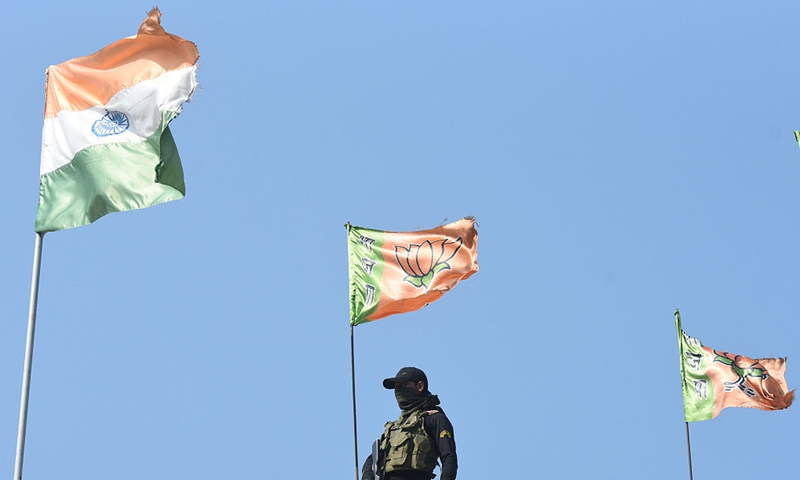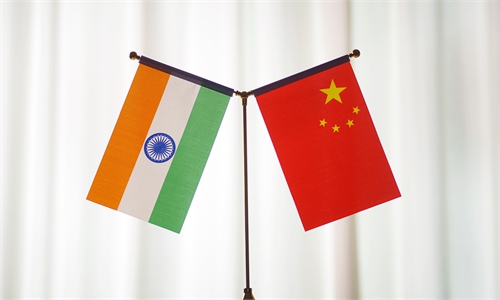IN-DEPTH / IN-DEPTH
India's BJP accused of 'intrusion' in neighboring countries through political, religious and ideological means

Photo:VCG
The Bharatiya Janata Party (BJP) recently tried again to enhance its influence in neighboring countries, but this time it failed and was met with clear resistance. Colombo and Kathmandu have both expressed outrage and condemnation against the recent remarks made in mid-February by Biplab Kumar Deb, Chief Minister of India's Tripura state, that the ruling BJP has plans to expand the party into neighboring countries like Nepal and Sri Lanka.
This is not the first time the BJP has looked ambitiously outward. The Global Times talked to Sri Lankan and Nepali people to learn about BJP's influence in local communities of neighboring countries, through NGOs or under the guise of religious welfare.
Experts say such moves completely exposed India's hegemony and expansionist ambitions as a self-defined superpower in the region.
BJP's national president Amit Shah had ambitions to establishing branches of the BJP in neighboring countries to win elections there and form a government.
The governments of Nepal and Sri Lanka have strongly opposed such politically motivated expansions of the BJP in their countries.
'Intrusion' in the name of Hindus in Nepal
Local Nepalese told the Global Times that there is a clear infiltration of the BJP in Nepal through various groups associated with it.
BJP is a right-wing party, and its policy has historically reflected Hindu nationalist positions. It has close ideological and organizational links to its older sister unit, Rashtriya Swayamsevak Sangh (RSS), a Hindu nationalist volunteer organization, a Nepali veteran political observer, told the Global Times.
The RSS was founded in 1925, before the independence of India, during the British colonial rule. The organization promotes ideals of upholding Indian culture and the values of its civil society while spreading Hindutva, a form of Hindu political nationalism, to strengthen the Hindu community. The purpose of its foundation is to establish the hegemony of Hindus and the Hindu way of life.
"The RSS in decades past had published a political map called Akhanda Hindustan (Indivisible Hindu's land) which incorporated small nations in the region, including Nepal. It was the master plan of the RSS to expand Hinduism in the region and to assimilate small neighboring nations into India," a political observer also a local journalist told the Global Times.
The RSS created another sister group called Hindu Swayamsevak Sangh (HSS). The organization had been working in different parts of Nepal in the early 1990s, said the observer. He further added that "they have been working as BJP's political tools in Nepal, but not openly. Outwardly it pretends to be a promoter and supporter of Hindu culture and identity, but there should be no doubts remaining that it is a branch of RSS that embraces the views of right-wing-politics."
The Nepali chief of the HSS is a powerful figure that has direct contact with BJP's central level leaders. India has its diplomatic missions in Nepal but, in some issues, the HSS has been playing a more active role, said the observer.
Some other similar organizations branching out from RSS are widely active in Nepal by providing education to Nepali youths about the Hindu religion. The BJP or RSS are believed to behind this as an effort to expand their influence in Nepal through this religious approach, the Global Times learned from some locals.
One of those organizations is called Shiv Sena (Army of Lord Shiva). It has branches in multiple Nepalese cities that run close-door camps while providing training to the Nepali youths. The training camps are sponsored by India's RSS. These are considered by some observers to be attempts to develop a separate religious army in Nepal.
Political intervention in Sri Lanka
Sri Lanka's Election Commission Chairman, Nimal Punchihewa, also opposed plans to expand the BJP's footprint in Sri Lanka soon after the announcement, saying the country's electoral law does not permit such an arrangement under any circumstances.
"The patriotic people in this country will not allow a foreign entity to enter the Sri Lankan political stage and take over power," the Joint Cabinet spokesperson of Sri Lanka, Udaya Gammanpila reiterated.
In a response to fierce criticism from the outside world and other political parties in India, BJP defended itself as committing to spread Indian culture to other countries but without any political ambition.
However, some locals do not agree.
"We always see Indian BJP members active on our local news, either in 'cordial meetings' with our regional leaders or performing supposedly friendly gestures, like giving donations. In fact, their ambitious gestures fully exposed their excessive nationalistic pride," Harshana Jayamanne, a graduate student at the University of Colombo, told the Global Times.
BJP's well-known interference in Sri Lanka's internal affairs has drawn wide criticism.
Happymon Jacob, an expert on international politics at Jawaharlal Nehru University in New Delhi, condemned the BJP-led government meddling in Sri Lanka's presidential election for setting a dangerous precedent.
BJP actively promoted a coalition led by Maithripala Sirisena to win over then-president Mahinda Rajapaksa in Sri Lanka's 2015 presidential election largely due to Rajapaksa's pro-China stance, according to Jacob.
Though BJP members maintain a fascination with Sri Lanka, and constantly stress common interests like a shared religion, culture, and history, in addition to offering aids. BJP's real intention in their soft power expansionist scheme is hardly concealed, Jayamanne said.
Jacob pointed out that it is a terrible idea to judge whether another country has close ties to India, or shows opposition to China, as a reason for meddling in their domestic politics.
Long history of political infiltration
The BJP has not made any public statements recently about their expansion into other countries in the more than three decades of its existence. There is no direct evidence suggesting that they have ever tried to set up branches of the party in neighboring countries or provide economic support to political organizations abroad.
However, BJP has always had ambitions to be the regional leader in South Asia. "India has always upheld the mentality of regional hegemony and has been interfering in the internal affairs of other countries as a way to consolidate their position," Qian Feng, Director of the Research Department at the National Strategy Institute at Tsinghua University, told the Global Times.
"The choice to start with two countries, Nepal and Sri Lanka, was also out of malice," Qian noted.
While BJP has always claimed to be a secular party, Hinduism occupies an important place in its governance. And in recent years, it has become increasingly religious and has gradually departed from its own pledge to a "secular governance."
Nepal had long been a Hindu Kingdom before it established itself as a secular country in 2006. The country used to be the only country in the world with Hinduism as state religion, through which BJP sees the possibility of bringing Nepal fully under Indian influence through religion.
Sri Lanka's second-largest ethnic group, the Tamils, who make up 15 percent of the country's total population, find their roots in India, practice Hinduism and have always had close ties with their roots, which is seen by the BJP as an opportunity.
A BJP official Twitter post said that it has constantly taken up issues of rights, welfare, and aspirations of their "Tamil brothers and sisters" in Sri Lanka. Projects they have launched include providing 50,000 homes for displaced Tamils in northeastern Sri Lanka and funding free ambulance services.
"India has never stopped infiltrating the two countries over the years, whether in terms of religion, culture or trading of goods, it is trying to strengthen their dependence and trust for India," said Qian, adding that BJP is a highly nationalistic party. "While never making public statements about expansion into other countries, it is fair to say that this has been their idea for a long time."
Qian reminded, however, that the news was not released publicly by senior party officials but was accidentally leaked through an internal party meeting. This suggests that India does not have a sound strategic layout for this plan and may only have a preliminary idea. The leak of the news put India in an extremely awkward position.
"India's policy towards neighboring countries in recent years has been a combination of threats and inducements," Qian said, "especially during the COVID-19 pandemic. India has been trying to take this opportunity to pull in neighboring countries. For example, India, in recent days, has been providing vaccines to neighboring countries."
At the same time, ironically, the leak of this plan has revealed India's true intentions.
This Indian plan could even risk pushing the small South Asian countries it has been trying to win over to China, Qian said.

